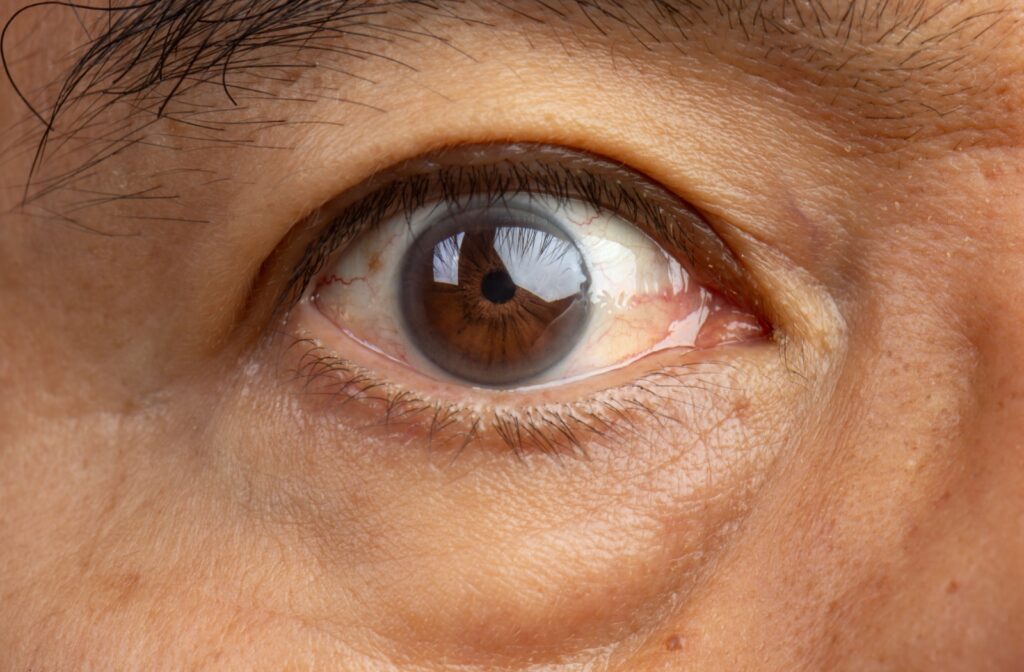Cataract surgery is one of the most common and successful procedures performed globally, offering millions of people the gift of clear vision. But one might wonder if you can get cataracts more than once.
The short answer is no—cataracts cannot come back after surgery, but there is more to this answer than yes or no. Vision changes after surgery can sometimes mimic the symptoms of cataracts, leaving patients feeling confused. Posterior capsule opacification (PCO) is a condition that can develop following cataract surgery.
Fortunately, it’s typically easy to deal with. But this highlights the importance of seeing your eye doctor for all recommended follow-up eye exams. If there are any complications or something like PCO develops, they can offer tailored treatment advice to keep your vision clear.
Understanding Cataracts
Cataracts occur when the natural lens of the eye becomes cloudy, primarily due to aging, prolonged UV exposure, or certain medical conditions. This cloudiness gradually blurs vision, creating challenges with daily tasks like reading or driving.
Fortunately, cataract surgery is a safe and effective procedure. During this procedure, an ophthalmologist removes your cloudy natural lens and replaces it with a clear, artificial lens called an intraocular lens (IOL).
Can Cataracts Recur?
While a cataract cannot physically come back once removed, a common condition called posterior capsule opacification (PCO) can create similar symptoms to those experienced with cataracts, including blurred vision and glare from bright lights.
What Is PCO?
During cataract surgery, the surgeon removes the clouded lens but leaves the transparent back portion of the lens capsule (called the posterior capsule) intact to support the new intraocular lens.
This capsule may become cloudy over time, typically due to the growth of lens epithelial cells. This cloudiness can feel like cataracts have returned, but it’s technically something different.
Luckily, an ophthalmologist can typically correct PCO with a special laser procedure called a YAG laser capsulotomy. This quick treatment restores clear vision and normally resolves the issue for good.

Factors That May Affect Post-Surgery Vision
While cataracts themselves won’t reappear after surgery, other factors may contribute to changes in vision or create the perception of re-developing eye problems.
Age-Related Changes
Even after cataract surgery, the eyes continue to age, which can lead to conditions like macular degeneration or glaucoma. These are unrelated to cataracts but can still impact your vision quality and may require an eye doctor’s intervention to prevent vision loss.
Lifestyle Factors
Certain habits, like smoking, excessive alcohol consumption, or prolonged sun exposure without UV protection, can increase the risk of new eye conditions that could impair vision over time.
Underlying Health Conditions
Conditions such as diabetes or high blood pressure can negatively impact eye health and lead to complications, even post-surgery. Long-term management of these conditions is essential for protecting vision. Specific diabetic eye evaluations are also available for those at increased risk or who already have diabetes.
Tips to Reduce the Risk of Vision Changes Post-Surgery
Even if a cataract can’t return, there are still some things you should consider regarding how you care for your eyes following cataract surgery.
- Protect your eyes from UV light: Wear sunglasses with UV protection to safeguard your eyes from the sun’s harmful rays.
- Maintain a balanced diet: Healthy eating can do wonders for your vision. Aim for a diet rich in antioxidants and omega-3 fatty acids to support overall eye health.
- Manage health conditions: Work with your healthcare provider to manage conditions like diabetes or hypertension that could compromise your eye health.
- Adopt a healthy lifestyle: Avoid smoking and excessive alcohol, as both are linked to increased risks for certain eye diseases.
- Regular eye exams: Schedule regular follow-up visits with your eye care professional. These exams ensure any concerns, such as posterior capsule opacification (PCO) or any other eye conditions, are caught and addressed early. The Canadian Association of Optometrists recommends that most healthy adults get an eye exam every 1 to 2 years, depending on age and other health factors.
Prioritize Your Eye Health After Surgery
With proper post-operative care, regular eye exams, and a proactive approach to your eye health, your chances of maintaining clear vision following cataract surgery are good. But even in the face of minor complications like PCO, your eye doctor can provide tailored advice and effective treatments and options.
If you’ve recently undergone—or are considering—cataract surgery, trust your eye care team to provide the guidance and resources you need to protect your sight. Don’t hesitate to contact our team at Northern Lights Optometry if you have questions or concerns about your vision.
Your eye health is important to us! We’re happy to book you an appointment with one of our experienced optometrists. They’ll take care of your eye health and help to answer any questions you may have.





